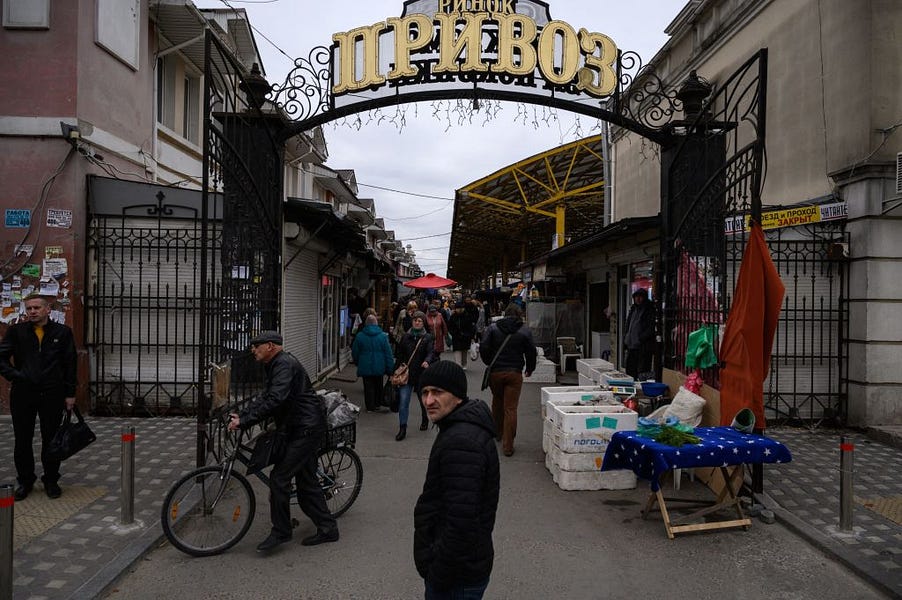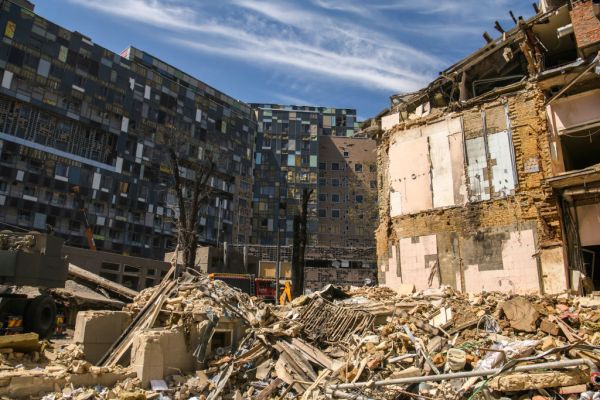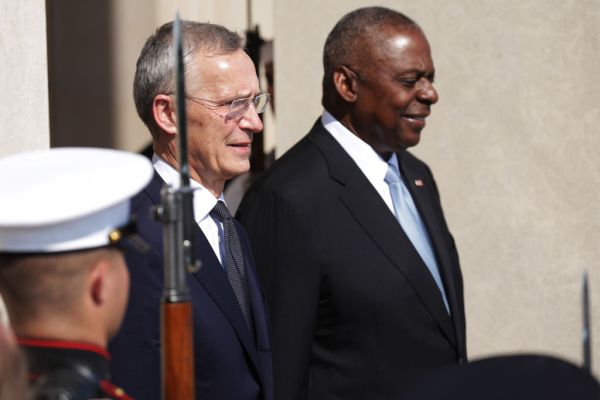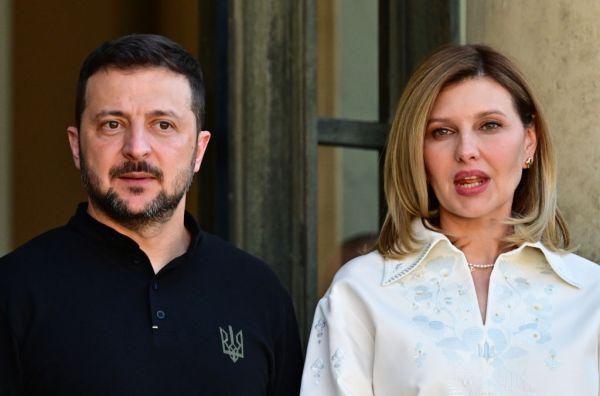All eyes are on eastern Ukraine right now. After failing to capture Kyiv and collapse the Ukrainian state, Vladimir Putin refocused his forces on achieving a decisive victory in the Donbas region. Based on reports of the fighting, it appears that the Russian army is attempting to break out through Ukrainian defenses around the city of Izym, about 75 miles southeast of Kharkiv. If they manage to break out, they can drive south and/or west and, possibly in coordination with another Russian assault from the south, attempt to surround Ukrainian units that are stationed on the frontlines of the “contact line” with the Russian positions in Donbas. These lines have not changed much since 2015, and Ukrainian and Russian forces are pretty well dug-in on either side. If Russia’s forces manage to surround all these troops, they will milk the “cauldron” for all the positive propaganda they can get and attempt to humiliate and collapse the Ukrainian government just using these events in the east. The Russian military tried something similar (though at a smaller scale) during the battle of Debaltseve in February 2015.
In the last few days, two senior Russian leaders and one Ukrainian pro-Russian subversive signaled what they want to do after that (or, what they want others to believe they will do after that): renew an attack on southern Ukraine.
In an interview posted on Wednesday, retired Col. Gen. Vladimir Shamanov, the former commander in chief of Russia’s airborne forces and a current member of the Russian parliament gave an assessment of the invasion of Ukraine so far:
“Russian troops achieved their goals as part of the first stage of the special operation… Of course, Mariupol and some other fortified areas have held back [Russian] units. As soon as we cut this Gordian knot, it will become much easier, and then we will take on the grouping that is between the Dnieper and the town of Izyum which is already, in essence, surrounded… Odesa is next. While there is an advance in the Nikolaev region, Odesa, like appendicitis, is blocked up, but I think that its turn will come.”
Shamanov is a maximalist, and he went on to say that in his opinion the war should not end until Russian troops have destroyed Ukraine’s “military potential in Western Ukraine: “If we do not resolve this issue with Ukraine now, future generations of Russian soldiers and officers will have to return to it.”
During an address on Friday to a defense industry association in the Urals, Maj. Gen. Rustam Minnekaev, deputy commander of the Russian Central Military District, stated that the goal of the “second phase” of Putin’s expanded invasion of Ukraine is “to establish full control over the Donbas and southern Ukraine. This will provide a land corridor to the Crimea, as well as influence the vital objects of the Ukrainian economy.” He made it clear that he meant the entirety of southern Ukraine: “Control over the south of Ukraine—it is another exit for Transnistria, where there are also facts of oppression of the Russian-speaking population.” He is referring to the Russian proxy of the Transnistrian Republic, an enclave in eastern Moldova that has hosted a Russian base with about 1,500 troops since the end of the USSR. So, in addition to a land bridge to Crimea, Minnekaev wants a land bridge to Transnistria.
Finally, also on Friday, in an interview with the Russian outlet Svobodnaya Pressa, Alexei Albu—the former Odesa local politician, pro-Russian separatist, and subversive terrorist leader—opined that the “liberation” of Odesa was one of the “minimum tasks of the special military operation in Ukraine.” According to him, the most likely scenario will be a Russian rush on Odesa after a Ukrainian defeat in the east: “After the defeat of the Armed Forces of Ukraine in the Donbas, Kiev will have no one to defend Odesa. This means that if we do not take advantage of this historic chance, we will lose Odesa forever.” He also predicted that the citizens of Odesa will be glad to be “liberated” as “the majority of Odesans are Russians.”
None of these three men are directly involved in the fighting in Ukraine, though it is possible that Albu is doing something on the periphery. However, the cluster of three similar statements all pointing to a future Russian attempt at Odesa, two of which were widely reported, makes one suspect that this is deliberate messaging. If this is messaging by the Russian state, it might be a statement of intent, but it might also be a feint: They may want Ukraine to be worried about protecting its southern flank, and so divert resources away from the fighting in the east. This is quite possible, but it is also possible that these men are all voicing their actual hopes, perhaps in a coordinated manner in line with a faction within the Russian state. Albu especially, as an exile from his hometown of Odesa, would be very eager to see Russian power return to his city, where he would likely be installed as a senior official. They may be lobbying Putin himself, trying to test the waters and see if other Russian generals say, “Yes, let’s try for Odesa!” especially after the battle for Donbas is over.
The embarrassing performance of the Russian military probably won’t last. The incompetent die off or get captured, and the more competent survivors cluster together and start to do better. Russian logistics issues won’t disappear, but if they concentrate their resources and fire the incompetents then things will get better. Also, if the Ukrainian logistics system collapses then Russia will have less pressure in its own fighting. Unlike Ukraine, Russia is in no danger of running out of shells, bullets, or fuel. The trick is getting supplies to the front. Ukraine, on the other hand, could conceivably run out of fuel, which would limit maneuverability, or run out of artillery ammunition, at least locally. If Russian forces succeed in the east it is quite possible that this summer could see a renewed Russian push toward Odesa. Putin may be going for broke, and if he has sunk so much into his war against Ukraine thus far, he may not balk at taking even more risks and expending even more resources, especially if he gets a taste of victory.
There is also the possibility of a “pause”—a break in the fighting, perhaps around May 9, when Russian troops will officially “go home” or declare the fighting finished. Then, after the troops are rested, new conscripts are trained, and ammunition and fuel brought up, Russia could resume an offensive against Odesa (or another target) after screaming about a new “Ukrainian provocation.” This is very close to what actually occurred between the Minsk I and Minsk II ceasefires in 2014-15. Many commentators seem to have forgotten that Ukraine and the “separatists” (Russian irregulars) signed a ceasefire in September 2014, and there followed a noticeable lull in the fighting. But starting in late September, Russia tried to seize the Donetsk airport. The ceasefire totally ended in early 2015 when Russian forces tried to encircle Ukrainian troops in Debaltseve. The “Minsk II” ceasefire was negotiated during this renewed fighting after Russia ended the first ceasefire.
The end of significant fighting in Donbas, whether Russia wins or loses, may not signal the end of the war in Ukraine, though it is possible that Russia will make the right noises so some (especially the Germans) will feel relieved, and resume making business deals with Russia and halt any efforts to supply Ukraine with fresh weapons. Any pause in helping Ukraine, while Russia will be preparing furiously for the next battle, could prove fatal.
This is why Ukraine needs long-term defense agreements with Western countries. Training on new weapons systems should start ASAP and supplies of heavy weapons that might take months and months, or even years, to make it to Ukraine should get underway now. There is no indication that the war will be over soon, even if fighting stops for a bit. There are elements of the Russian state who certainly do not feel like this is going to be a limited operation. In that speech given Friday Maj.Gen, Minnekaev delivered this line: “Apparently, we are now at war with the whole world, as it was in the Great Patriotic War, the whole of Europe, the whole world was against us. And now it’s the same, they never loved Russia.” Skipping over the very Soviet attempt to pretend that the USSR had no allies in World War II, notice that Minnekeav does not see that the world is against Russia and then conclude, “Oh, I suppose we should stop fighting then.” The only way to convince him and people like him to stop fighting is if the pain is too great. Like Finland in the 1940s, the Ukrainians have to hurt the Russians so much and be so prepared to do it again that the Russians don’t consider renewing the fight.








Please note that we at The Dispatch hold ourselves, our work, and our commenters to a higher standard than other places on the internet. We welcome comments that foster genuine debate or discussion—including comments critical of us or our work—but responses that include ad hominem attacks on fellow Dispatch members or are intended to stoke fear and anger may be moderated.